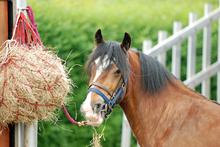When scientists look for life on other planets, the single substance they look for is water. Why? Because every single organism we know of - needs water. For sake of the obvious, horses, like humans, can survive longer without food, than without water.

Maximizing nutrition by soaking hay
Often recommended by veterinarians, soaking hay in water increases the overall health of a horse by reducing excess sugars and commercial contaminants while naturally increasing the horse's hydration.
Water acts as both a solvent and a delivery mechanism, dissolving essential vitamins and nutrients from food and delivering them to cells. Horse's bodies also use water to flush out toxins, regulate body temperature and aid in metabolism. No wonder, then, water is the most important nutrient in a horse's diet.
First, let's discuss how a horse utilizes water systemically. Horses lose water in a variety of ways. Water loss occurs through feces, urine, respiratory gases, milk in lactating mares, and sweat. A study conducted by Thomson and Leitch concluded that horses need 2 to 3 liters of water per kilogram of dry matter intake.
In the wild, horses depend on their food for the majority of their water intake. However, this is not the case for domesticated horses. Dried hay, the number one source of food for the domestic horse, contains less than 11% moisture. This is a huge systemic loss of a beneficial water source for the horse.
Second, water is the single biggest resource your horse has to allow his body systems to function properly. For example, horses should produce 10 gallons of saliva, and have 30 gallons of water available for the small intestine - that is just a portion of the water requirements for proper digestion.
You can see, a dehydrated horse is physically incapable of functioning to its designed potential and thus leads to system wide and digestive disturbances, including ulcers, and colic.
Third, at what point is a horse dehydrated? Dehydration is simply defined as not as much water as one should have. Simple enough... but what does that mean? Dehydration actually occurs much more quickly than you might think.
When dehydration occurs, the blood thickens. Therefore, the cardiovascular system has to work extra hard to get the blood around to maintain muscles and vital organs. As a result, some organs and systems are left without proper blood flow - i.e. Skin. The skin reacts and is able to tent. Tenting is when you pinch the skin and it stays in the "tent" position for a second or two before returning to flat. As you can hypothecate, when dehydration occurs, your horse, is much more likely to become injured as a result of improper blood flow.
Finally, work increases the need for water by 20 to 300 percent. In the working horse, significant amounts of water are required for thermoregulation. Thermoregulation is the ability to maintain body temperature regardless of environment. An example of thermoregulation, a horse sweats to cool off.
When a horse sweats, it results in fluid loss for the animal. It is very difficult to detect losses under 5%. However, at a loss of 2% there is a 10-20% reduction in performance. A huge reduction in performance and we don't even know it. This reduction can be observed in impairment in reaction time, judgment, concentration, etc. Not only does proper hydration keep your horse performing at the top of his game, it also enables him to train harder, longer, and recover faster.
But... how do we maintain these proper levels of hydration? We all know we can't make our horses drink. Or can we?
A single soaked flake of hay can hold between one to two gallons of water. For an 1100 lb horse, fed 4 flakes of hay per day, that can equate to up to 8 gallons of water per day just from their feed.
In short, by soaking hay, we are supplementing the most important nutrient of all... water.
Often recommended by veterinarians as a preventative treatment, soaking dry feed or hay in water increases the overall health of a horse by significantly reducing excess sugars and commercial contaminants while naturally increasing the horse's hydration.
With the creation of The Soaker, Jennifer Azevedo has standardized hay soaking. Made in the USA, The Soaker is a nonelectric automatic hay and feed soaker that is a timed, portable, self-contained unit that only requires a pressurized water source to run. The Soaker will fill, soak, and drain automatically, leaving your horse's food cleaned and hydrated every time like clockwork.
Text By Jennifer Azevedo
